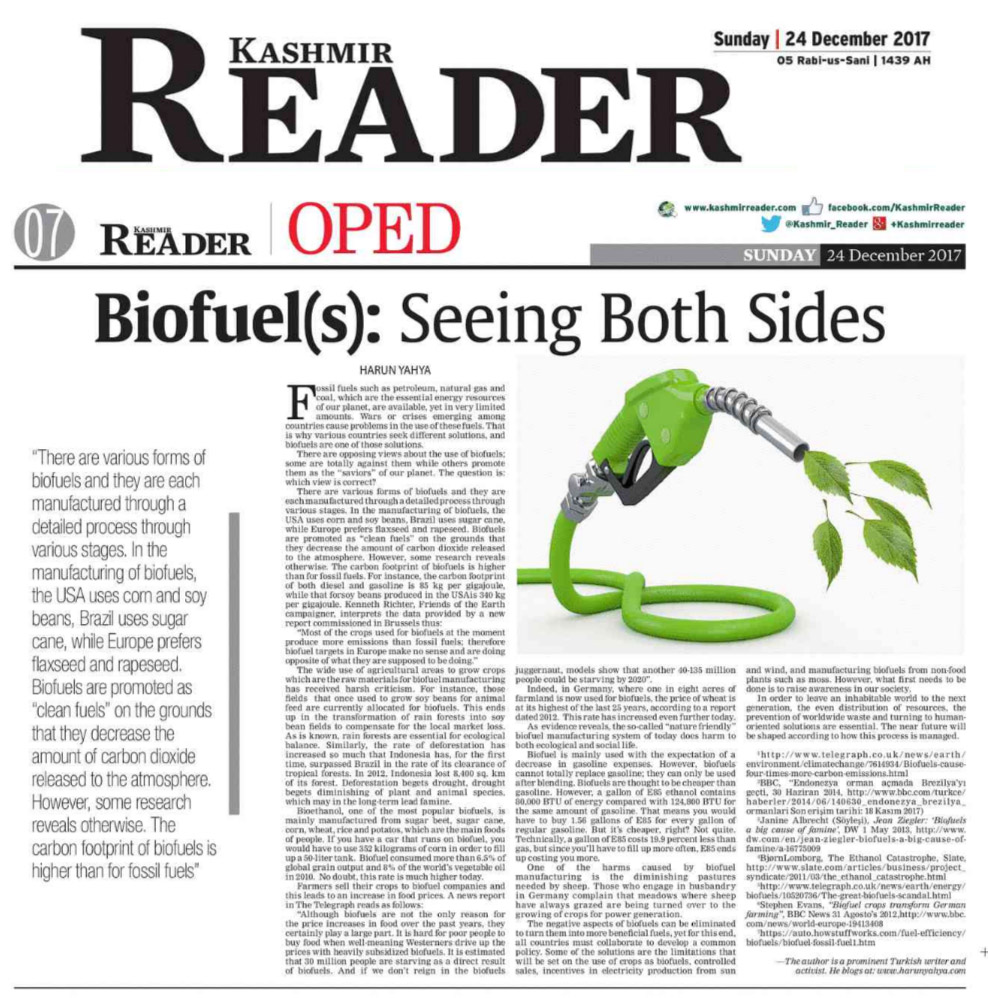Bigotry: The Dark Danger
Biofuel(s): Seeing Both Sides

Fossil fuels such as petroleum, natural gas and coal, which are the essential energy resources of our planet, are available, yet in very limited amounts. Wars or crises emerging among countries cause problems in the use of these fuels. That is why various countries seek different solutions, and biofuels are one of those solutions.
There are opposing views about the use of biofuels; some are totally against them while others promote them as the “saviors” of our planet. The question is: which view is correct?
There are various forms of biofuels and they are each manufactured through a detailed process through various stages. In the manufacturing of biofuels, the USA uses corn and soy beans, Brazil uses sugar cane, while Europe prefers flaxseed and rapeseed. Biofuels are promoted as “clean fuels” on the grounds that they decrease the amount of carbon dioxide released to the atmosphere. However, some research reveals otherwise. The carbon footprint of biofuels is higher than for fossil fuels. For instance, the carbon footprint of both diesel and gasoline is 85 kg per gigajoule, while that forsoy beans produced in the USAis 340 kg per gigajoule. Kenneth Richter, Friends of the Earth campaigner, interprets the data provided by a new report commissioned in Brussels thus:
“Most of the crops used for biofuels at the moment produce more emissions than fossil fuels; therefore biofuel targets in Europe make no sense and are doing opposite of what they are supposed to be doing.”
The wide use of agricultural areas to grow crops which are the raw materials for biofuel manufacturing has received harsh criticism. For instance, those fields that once used to grow soy beans for animal feed are currently allocated for biofuels. This ends up in the transformation of rain forests into soy bean fields to compensate for the local market loss. As is known, rain forests are essential for ecological balance. Similarly, the rate of deforestation has increased so much that Indonesia has, for the first time, surpassed Brazil in the rate of its clearance of tropical forests. In 2012, Indonesia lost 8,400 sq. km of its forest. Deforestation begets drought, drought begets diminishing of plant and animal species, which may in the long-term lead famine.
Bioethanol, one of the most popular biofuels, is mainly manufactured from sugar beet, sugar cane, corn, wheat, rice and potatos, which are the main foods of people. If you have a car that runs on biofuel, you would have to use 352 kilograms of corn in order to fill up a 50-liter tank. Biofuel consumed more than 6.5% of global grain output and 8% of the world’s vegetable oil in 2010. No doubt, this rate is much higher today.
Farmers sell their crops to biofuel companies and this leads to an increase in food prices. A news report in The Telegraph reads as follows:
“Although biofuels are not the only reason for the price increases in food over the past years, they certainly play a large part. It is hard for poor people to buy food when well-meaning Westerners drive up the prices with heavily subsidized biofuels. It is estimated that 30 million people are starving as a direct result of biofuels. And if we don’t reign in the biofuels juggernaut, models show that another 40-135 million people could be starving by 2020”.
Indeed, in Germany, where one in eight acres of farmland is now used for biofuels, the price of wheat is at its highest of the last 25 years, according to a report dated 2012. This rate has increased even further today.
As evidence reveals, the so-called “nature friendly” biofuel manufacturing system of today does harm to both ecological and social life.
Biofuel is mainly used with the expectation of a decrease in gasoline expenses. However, biofuels cannot totally replace gasoline; they can only be used after blending. Biofuels are thought to be cheaper than gasoline. However, a gallon of E85 ethanol contains 80,000 BTU of energy compared with 124,800 BTU for the same amount of gasoline. That means you would have to buy 1.56 gallons of E85 for every gallon of regular gasoline. But it’s cheaper, right? Not quite. Technically, a gallon of E85 costs 19.9 percent less than gas, but since you’ll have to fill up more often, E85 ends up costing you more.
One of the harms caused by biofuel manufacturing is the diminishing pastures needed by sheep. Those who engage in husbandry in Germany complain that meadows where sheep have always grazed are being turned over to the growing of crops for power generation.
The negative aspects of biofuels can be eliminated to turn them into more beneficial fuels, yet for this end, all countries must collaborate to develop a common policy. Some of the solutions are the limitations that will be set on the use of crops as biofuels, controlled sales, incentives in electricity production from sun and wind, and manufacturing biofuels from non-food plants such as moss. However, what first needs to be done is to raise awareness in our society.
In order to leave an inhabitable world to the next generation, the even distribution of resources, the prevention of worldwide waste and turning to human-oriented solutions are essential. The near future will be shaped according to how this process is managed.
http://www.telegraph.co.uk/news/earth/environment/climatechange/7614934/Biofuels-cause-four-times-more-carbon-emissions.html
2BBC, “Endonezya orman açmada Brezilya’yı geçti, 30 Haziran 2014, http://www.bbc.com/turkce/haberler/2014/06/140630_endonezya_brezilya_ormanlari Son erişim tarihi: 18 Kasım 2017)
3Janine Albrecht (Söyleşi), Jean Ziegler: ‘Biofuels a big cause of famine’, DW 1 May 2013, http://www.dw.com/en/jean-ziegler-biofuels-a-big-cause-of-famine/a-16775009
4BjørnLomborg, The Ethanol Catastrophe, Slate, http://www.slate.com/articles/business/project_syndicate/2011/03/the_ethanol_catastrophe.html
5http://www.telegraph.co.uk/news/earth/energy/biofuels/10520736/The-great-biofuels-scandal.html
6Stephen Evans, “Biofuel crops transform German farming”, BBC News 31 Agosto’s 2012,http://www.bbc.com/news/world-europe-19413408
7https://auto.howstuffworks.com/fuel-efficiency/biofuels/biofuel-fossil-fuel1.htm
Adnan Oktar's piece in Kashmir Reader (India):
https://kashmirreader.com/2017/12/24/biofuels-seeing-both-sides/
2017-12-27 05:07:50






